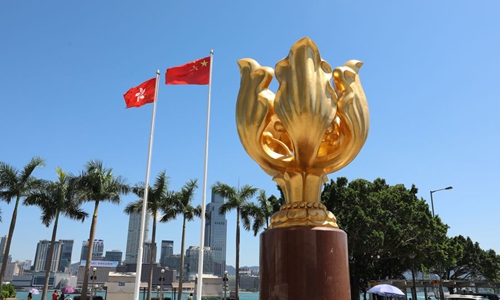Passing national security law in HK shows central government’s determination: expert
By Bai Yunyi Source:Global Times Published: 2020/5/21 22:16:38

Formulating a national security legislation for Hong Kong shows that the central government is determined to safeguard its sovereignty over the special administrative region and will protect the territory from falling into the hands of the hostile forces at all cost, especially after the Hong Kong SAR government has been weakened in the past years fending off growing risks caused by local secessionists and foreign intervention, a senior expert close to the central government on Hong Kong affairs told the Global Times on Thursday.
Proposing the Establishment and Improvement of the Legal System and Implementation Mechanism for the Safeguarding of National Security in the Hong Kong SAR aims to not only tackle the current chaos in Hong Kong, but also prevent Hong Kong from posing a potential national security threat to the country, Lau Siu-kai, vice president of the Chinese Association of Hong Kong and Macao Studies, told the Global Times on Thursday.
While the riots continue in Hong Kong and the US increases its efforts to contain the Chinese mainland, Washington's intention of using Hong Kong as a pawn to counterbalance the China has become increasingly palpable, the expert said. Faced with such a severe situation, it has become an urgent task for the Chinese central government to deal with the chaotic situation in Hong Kong, and such determination and urgency had turned out to be very strong in the communiqué of the fourth plenary session of the 19th CPC Central Committee held in October 2019, he noted.
"When the pros and cons are evaluated, the only uncertain thing left is how to implement the law," Lau added.
In the face of mounting external pressures, the Hong Kong Special Administrative Region government's ability to govern has been continuously weakened, and confidence has been lost in the SAR government to push forward Article 23 of the Basic Law in the short term, Lau noted.
"Though it would be successfully established, the effectiveness and strength of the law cannot be expected," he said, noting that under such circumstances, the central government would formulate national laws that would be effective in Hong Kong, and would place them in Annex III of the Basic Law to ease the social unrests through decisive and powerful means.
This also shows that to protect national sovereignty over the SAR and prevent the jurisdiction of the SAR from falling into the hands of hostile forces, the central government "will maintain its basic interests and principles at all costs."
The adoption of the "Hong Kong version of the National Security Law" will inevitably incur fierce reaction and protests in the city. However, the central government's determination would also change the psychological expectations of pan-democratic groups, which might reverse the situation in Hong Kong, Lau noted.
"Previously, some people always had this delusion that the central government would not take aggressive and decisive measures as it is afraid of a public backlash in Hong Kong or US sanctions. But they have to reevaluate the price they are willing to pay to achieve their goals," he said.
The Chinese government is taking Hong Kong as an example, sending a clear message to the US on issues related to China's national sovereignty and security, and will never yield. It's also a strong signal to other separatist forces abroad, Lau added.
Lau noted that when it is passed, the US will likely use the Hong Kong Human Rights and Democracy Act to challenge China. But he cautioned that the passage of the Hong Kong act last year was, in essence, a "tentative threat" to test China's courage.
"China is now using the Hong Kong issue to send a crystal clear message to the US that China will never back down on issues involving its national sovereignty and security. This strong signal is also a serious warning to Taiwan authorities and other separatist forces overseas," he said.
RELATED ARTICLES:
Posted in: POLITICS,FOCUS右